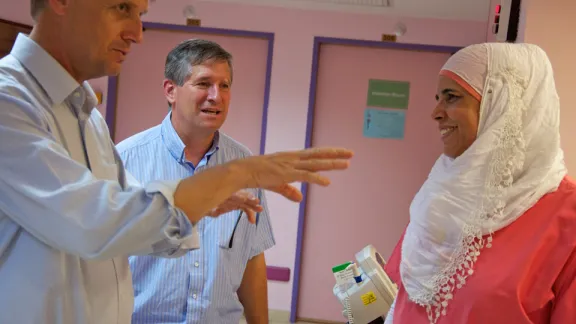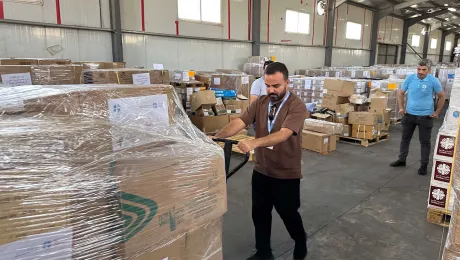
Elizabeth Arciniegas, Evangelical Lutheran Church of Colombia (IELCO), speaks during the Women and Gender Justice Network session at the LAC regional gathering on sustainability and human resource development. © LWF/Edwin Mendivelso
Lessons Learned from Latin America and Caribbean Lutheran Churches
Representatives of The Lutheran World Federation (LWF) member churches in the Latin America and Caribbean (LAC) region affirmed how strategic training for ordained and lay people is promoting church growth and encouraging more participation of members in the church’s prophetic mission.
“We feel that all our team members—from the pastors to the administrative workers—understand this process of ‘just learn and do it,’” Linda M. Perez Gomez of the Christian Lutheran Church of Honduras said of the LWF-supported five-year (2007-2011) sustainability program to develop churches’ local capacity and empower leadership.
“We are beginning to grow in numbers and at the same time have the spirit to work together, to join our efforts as a first base and take our decisions collectively,” she added.
Perez and some 50 other participants at the 18-22 September LAC meeting in Santa Cruz, Bolivia, reviewed the lessons learned and challenges encountered by the 16 LWF member churches in processes to strengthen their capacity to witness in situations dealing with poverty, violence and inequality.
The process of accompaniment, consciousness raising, capacity development, inclusion and sharing of responsibility was important for the churches involved in the five year program, she added.
The LWF Department for Mission and Development (DMD) organized the meeting hosted by the Bolivian Evangelical Lutheran Church. Networks of women and youth, persons living with disabilities, educators and diaconal workers, and church leaders were represented.
“The church’s programs would have had more possibility of success in our churches and communities if we had taken care of the development of the human capacity of the people, the ministries and the lay leaders,” said Miltom José de Oliveira of the Evangelical Church of the Lutheran Confession in Brazil.
Oliveira added he was convinced that the region’s churches were now headed in the right direction with more strategic plans to offer the kind of formation and training that will help lay and ordained persons serve the church and community.
More Participatory
United Evangelical Lutheran Church (Argentina) participant Enrique Nery Kallsten explained how his church had worked through home Bible study to become more engaged and responsible to one another.
“Our church needed a strategic plan. We needed to organize our ministries and make them more participatory for the members so that they might offer their gifts for the well-being of the church,” he said.
Rev. Everardo Stephan of the Evangelical Church of the River Plate (Argentina) maintained that ministries that focus on gender, youth and children required special training and urged the LWF to support these areas of work.
A key learning from the Santa Cruz meeting was the importance of developing the capacities and gifts of people and institutions so that church ministries can function well. “I am very excited about the sustainability program. It’s more than a program. It is a way to be church,” Stephan added.
It was also suggested by Rev. Guadalupe Cortéz of the Salvadoran Lutheran Church that the LWF LAC region should work collectively to create a frame of reference for its ministry.
Abebe Yohannes Saketa, LWF secretary for Human Resources Development at DMD, noted that the meeting had provided a “very rich content” because of the new perspectives developed under the five-year program.
“This meeting was unique and distinct from the previous gatherings, as I noted from the reports and comments. It was broader since about half of the participants were here for the first time. It was richer, due to new perspectives developed and presented. It was also deeper as it revealed several issues of mutual concern,” said Saketa.
The LAC meeting was part of the LWF’s strategic efforts to realign human capacity development initiatives among the member churches. A framework for long-term planning has been formulated for adaptation and use at church level.
(Bogota [Colombia]-based journalist Edwin Mendivelso contributed to this story.)


